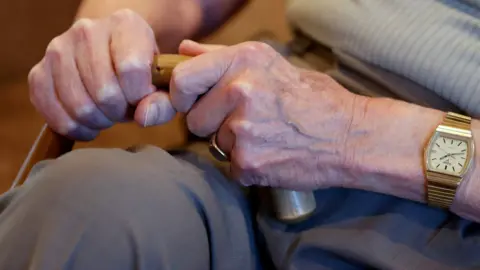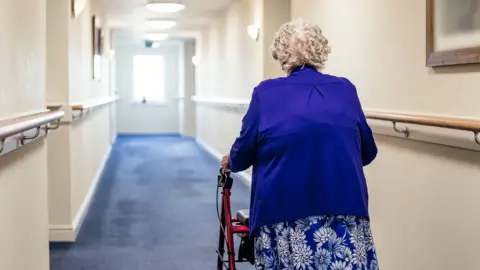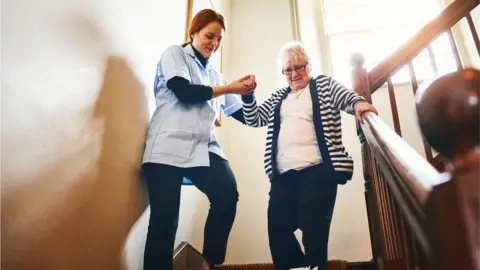Coronavirus: 1,000 discharged to care homes without virus test
 Reuters
ReutersMore than 1,000 hospital patients were discharged to Welsh care homes without a coronavirus test at the start of the outbreak.
The Welsh Government confirmed 1,097 patients were sent from hospital to care homes without being tested for Covid-19 during March and April.
Care Forum Wales said care homes felt under pressure to take hospital patients without tests.
It said this "turned safe havens into coronavirus warzones".
Office for National Statistics show there have been 654 Covid-19 deaths in Welsh cares homes to 5 June - accounting for 28% of all coronavirus deaths in Wales.
Care Inspectorate Wales compiles its own figures, which showed it was notified of 2,937 deaths in care homes since 1 March.
This is 86% higher than deaths reported for the same time period last year, and 54% higher than for the same period in 2018.
BBC Wales Investigates discovered that at the start of the outbreak, the Welsh Government issued guidance saying hospitals could discharge Covid-19 patients to care homes and that patients without common symptoms did not have to be tested before they were moved.
 Getty Images
Getty ImagesNigel Clark, owner of a care home in Port Talbot, was interviewed, who said he felt pressured to take patients from hospitals despite them not being tested for coronavirus.
"She (a health board representative) said she would go to the Care Inspectorate to ensure I had to start taking people into this care home if they had tests or not because I had to help Neath Port Talbot to release beds," he said.
Swansea Bay University Health Board said it could never condone the behaviour Mr Clark alleges, and that all patients are now tested before being sent into care homes.
The Older People's Commissioner raised concerns that comprehensive testing for Covid-19 in care homes was "too slow".
The Welsh Government said the policy change from just testing care home residents with common symptoms to all residents, with or without symptoms, was not introduced until 29 April.

But its figures show that 1,097 patients were discharged from hospital to care homes before the policy change - 798 in March and 299 in April.
In a previous written answer to Conservative MS Andrew RT Davies, the Welsh Government revealed that 1,328 patients in total were discharged from Welsh care homes in March and April.
Therefore, based on Welsh Government figures, 82% of all residents discharged from Welsh hospitals at the start of the outbreak were sent to care homes without a Covid-19 test.
The Welsh Government has maintained that it has been following the scientific advice throughout the crisis.
 Getty Images
Getty ImagesBut, on June 14, the health minister conceded he would have made "different choices" at a number of points during the pandemic.
Speaking on BBC Wales' Politics Wales programme, Vaughan Gething MS said: ""It should always have been the case that anyone who was symptomatic should have been tested and that was our understanding of the science and the evidence at the time when all of the choices were made.
"We of course developed further understanding and further knowledge, so if I had the knowledge I have today, I'd have probably made different choices at a number of points in the coronavirus pandemic.
"We certainly haven't taken a cavalier approach."
Responding to the latest figures, Mario Kreft, chairman of Care Forum Wales, said: "We are paying the price for the way social care was pushed to the back of the queue when it came to having the necessary resources to protect residents and staff from Covid-19.
'Exceptionally infectious'
"The number of care home deaths from Covid is shocking but sadly not surprising when you consider the NHS was so prioritised in the early days with social care left to fend for itself.
"Anecdotally, the message from our members is that it would appear admissions from hospitals have been a major factor in spreading the virus like wildfire in those care homes, as opposed to community transmission."
He added: "Care homes felt they were being put under pressure to admit hospital patients who were Covid-19 positive or without being tested. Where this occurred it turned safe havens into coronavirus warzones.
"Once the wolf was through the door it was too late because this contagion is so exceptionally infectious."
Conservative Member of the Senedd Janet Finch-Saunders has called for an "urgent inquiry" into the hospital discharges.
"We need to be able to determine whether vulnerable people and other residents within the homes have come to harm as a result of the Welsh Government's negligent approach to care home testing. It could have resulted in Covid-19 being introduced," she said.
She said she had been contacted by care professionals who said they were they were "hounded" by hospitals to accept patients.
Plaid Cymru's Delyth Jewell said: "Why the Welsh Government allowed over a thousand patients to enter care homes from hospitals without being tested for Covid-19 will be one of the main questions the forthcoming public inquiry will need to ascertain.
"The first minister told me back in April that these tests weren't carried out on patients unless they displayed symptoms because there was 'no value' in doing so, but has since refused to offer any evidence to support this claim.
"I suspect that the real reason had more to do with prioritisation of the limited amount of tests that were available at the time."
But First Minister Mark Drakeford insisted the Welsh Government followed the advice they were given.
He said ministers did not have "the virtue of hindsight" when they had to make decisions to deal with the pandemic.
He said: "Early on the advice to was test symptomatic people, anybody who had symptoms were tested before they left hospital, and the advice early on was the that the testing of people without symptoms would not have given useful outcomes.
"When the advice changed, we changed the practice."